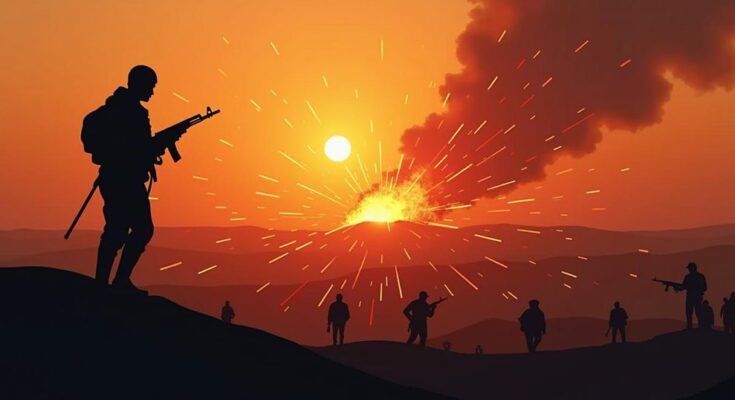The assassination of Hezbollah leader Hassan Nasrallah has heightened fears of a broader conflict in the Middle East, prompting speculation about Iran’s potential response and Israel’s military ambitions. Diplomatic efforts to stabilize the region are ongoing but have faced challenges, leaving the likelihood of escalated hostilities uncertain.
The recent assassination of Hassan Nasrallah has heightened concerns regarding the potential for a broader conflict in the Middle East, particularly involving Iran and Hezbollah. As tensions escalate, observers are left questioning whether a regional war is now imminent. The United States, alongside its allies, is determined to prevent such an outcome, with officials issuing urgent calls for de-escalation and diplomatic solutions. The assassination, viewed as a significant strike against Hezbollah, a group recognized as a terrorist organization by the United States and several Western nations, has raised fears about retaliatory actions. President Joe Biden described the killing as a form of “justice.” However, despite the heightened tensions, there are complex factors at play that may deter immediate escalation. Iran could feel compelled to act in support of Hezbollah, fearing the ramifications of its ally’s weakness. Historically, Hezbollah has been regarded by Iran as a buffer against potential Israeli aggression. Nonetheless, Iran’s own fraught political and economic circumstances, compounded by sanctions and domestic unrest, may dissuade it from escalating military involvement. Moreover, the logistical challenges of intervening in a conflict situated over 2,000 kilometers from its borders may also weigh heavily on Iran’s strategic calculations. Simultaneously, Israel may exploit this moment of perceived advantage to further its military objectives in Lebanon, possibly leading to a ground invasion aimed at neutralizing Hezbollah’s capabilities. Such a move could have destabilizing repercussions, not only for Lebanon, which has long struggled with fragile political alliances but also for regional stability. Should Hezbollah begin retaliatory actions or if Lebanon spirals back into internal conflict, the potential for broader hostilities involving various regional powers could increase significantly. The current dynamics place the Middle East in a precarious situation, with diplomatic efforts ongoing but struggling to yield tangible results. As the situation continues to unfold, the actions of both Iran and Israel, as well as the responses of regional players, will be crucial in determining whether the region descends into a wider war.
The assassination of Hassan Nasrallah, the leader of Hezbollah, marks a pivotal moment in the ongoing tensions in the Middle East. The implications of this event raise critical issues regarding the future stability of the region, particularly in relation to Iran’s longstanding involvement through its support for Hezbollah. The delicate balance of power in Lebanon and the broader geopolitical landscape involving key players such as the United States and Israel adds layers of complexity to the potential for conflict. Given the historical context of Iran’s alliance with Hezbollah and Israel’s strategic responses, understanding these dynamics is essential in assessing the likelihood of an escalation into regional warfare.
The assassination of Hassan Nasrallah poses significant risks for regional stability in the Middle East, with implications that extend beyond Lebanon. While both Iran and Israel face critical decisions, the potential for a wider conflict hinges on their actions and strategies in the wake of this event. The cautious pragmatism of the Iranian leadership alongside the strategic ambitions of Israel will ultimately shape the future trajectory of regional relations. With existing diplomatic efforts proving ineffective, the situation remains highly volatile and demands vigilant monitoring as developments unfold.
Original Source: news.sky.com



